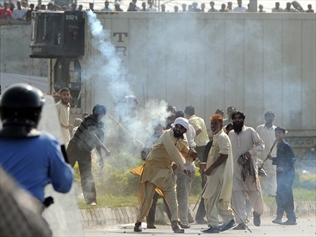
Islamabad/Karachi, September 22: Nearly 20 people were killed and hundreds injured on Friday when thousands of angry demonstrators during government-sanctioned protests over an anti-Islam film turned violent in several cities across Pakistan on a day being observed as ‘Love the Prophet Day'.
The worst affected was Pakistan's financial hub Karachi, where 14 people were killed including two policemen who were shot dead. Around 110 others injured when anti-film rallies turned violent and anarchy prevailed for many hours in some parts of the coastal city. Officials said nearly 200 people were injured in Islamabad, Karachi and Peshawar before the protests tapered off at nightfall.
Rampaging mobs destroyed private and government property worth crores of rupees across the country. Protestors vandalised and torched three cinema halls and the chamber of commerce in Peshawar in the northwest. Five persons, including an employee of a TV news channel, were killed in violence in Peshawar city, officials said.
ARY News said its employee Mohammad Amir died after being hit by a bullet in police firing. Others were killed in police firing or clashes between protestors and police. Footage on television showed several armed protestors firing during demonstrations. In Karachi, mobs torched three cinema halls, three government offices, three banks and several police vans near the CM's residence.
At many places, crowds of protestors looted shops and private buildings. A toll plaza and several vehicles were burnt by protestors on the outskirts of Rawalpindi. Protestors also vandalised a CNG pump, blocked roads by burning tyres and lobbed stones at passing cars.
Hundreds of protestors gathered near the gates of the US Consulate in Lahore before they were driven back by security forces at 7.30 pm. Paramilitary Pakistan Rangers personnel were deployed after a police post was torched near the mission.
Lahore Police spokesman Niyab Haider said 11 people, mostly policemen, were injured in the clashes.
Thousands of students and members of hardline groups tried to get past police barriers in Islamabad and march to the diplomatic enclave, home to the embassies of the US and most Western countries. Police used rubber bullets and teargas to push back demonstrators, who continued making efforts to enter the enclave till darkness fell.
No need to take down clip: US court
A Los Angeles judge has refused to order YouTube to take down a controversial film clip, “The Innocence of Muslims”, agencies report from Los Angeles. Los Angeles County Superior Court Judge Luis Lanvin ruled that Cindy Lee Garcia failed to show that she would likely prevail on the merits of her request, despite the actress's claim that she was tricked into appearing in the inflammatory film, reported Xinhua citing the Courthouse News.
The YouTube clip has triggered violent anti-American riots and protests in more than 20 countries, and has led to at least 28 deaths, including the killing of US ambassador to Libya Christopher Stevens.





Comments
Add new comment